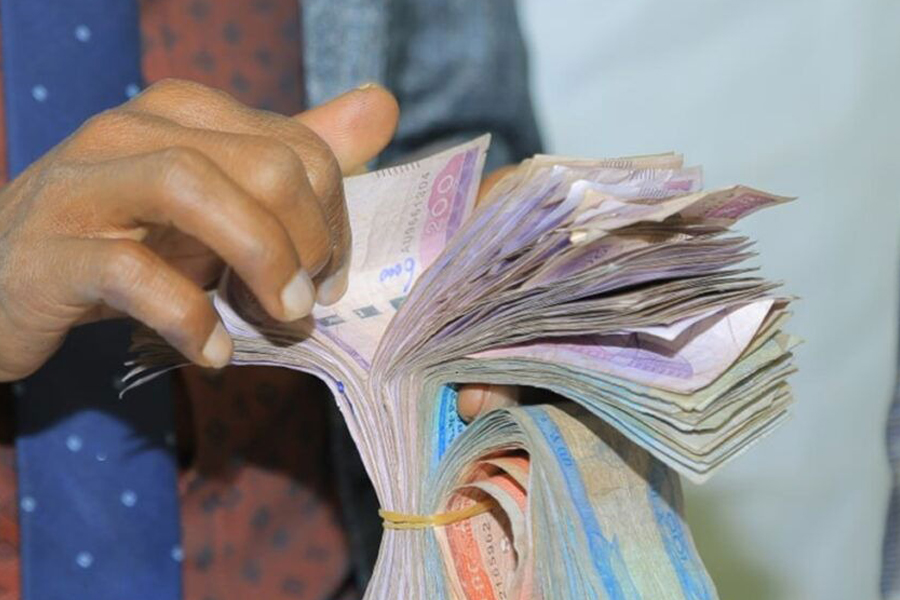
The sky was gloomy; it was a cloudy afternoon last week. The typical August weather of fog and chill was reflected in the mood of the city residents, such as Shewaminale Mekonnen, the chief financial officer of the East African Holdings Group. He was in a rush to leave office, perhaps contemplating about the weather of the day. But before he could venture out for a good lunch, he had to do one more thing - send an important email.
News popped up on his Telegram account, one of the main platforms people use these days to receive breaking news. It was about the instruction regulatory authorities at the central bank had made to the heads of the commercial banks operating in the country. They were told to freeze asset-based collateral lending until further notice.
There must have been some mistake, Shewaminale had thought, sitting in awe and silence in his 28sqm office inside a building in the Sarbet area. Either the newspeople failed to grasp the essence of the instruction, or, he was convinced, it was a baseless rumour. His colleagues called. Friends followed. It was for real; banks are not to provide the economy with fresh loans, and they would suspend those already approved to be disbursed.
The company he works for was not to access 70 million Br in loans borrowed from a private bank to buy trucks for daily operations. Shewaminale realised how dire the situation was when the bank's loan officers informed him that his company could not process a pre-shipment loan, an important facility to buy commodities from local suppliers and export abroad.
“This will definitely disrupt the operations of our company," said the senior executive overseeing the financial operations of a conglomerate with 17 subsidiaries from agriculture to manufacturing and from trade to real estate, with five billion Birr in annual turnover. "Its repercussion won’t be light."
For many within the financial sector and in the broader economy, the authorities' decision to freeze loans came out of nowhere. It was communicated to the top executives of the banks on Thursday afternoon through text messaging. Such a consequential decision by the National Bank of Ethiopia (NBE) has yet to be delivered to the banks in the formality the situation calls for. However, in the absence of an official explanation, speculations of its motive abound.
Banking industry insiders see the measure by the central bank as a desperate move to hold back the run the Birr has against major currencies, particularly of the Dollar. The Birr is fast losing ground both in the formal and parallel markets. The exchange market is more volatile than ever before due to a combination of factors. In a tightly regulated exchange market, individuals and businesses offer large sums of money to buy foreign currencies, a fact well understood by policymakers and regulators at the central bank.
In the official market, the Birr has depreciated against the dollar by almost 40pc over the past three years and exchanged for 45.5 Br last week. The pace of the erosion in the parallel market is alarming to those who keep watch on the economy. Hovering at 70 Br against the Dollar, the gap with the official exchange market has never been so wide. It is no different from other oft-traded currencies. The Pound Sterling reached a record-high of 90 Br, while 10 Br less is offered to exchange for the Euro.
Regulators at the central bank blame hidden hands active in undermining the broader economy. Fikadu Digafe, vice governor of the central bank and its chief economist, sounded certain of this.
“It's the outcome of economic sabotage,” the Vice Governor told Fortune, referring to the sudden spike of the 55pc gap witnessed between the official and the parallel markets, a jump of 25 percentage points in just two weeks.
Against the backdrop of this surge in the value of foreign currencies is a series of policy and administrative measures the authorities have taken since Prime Minister Abiy Ahmed (PhD) took the helm in 2018. The Prime Minister made an arguably haphazard statement in public cautioning individuals with dollars in their possessions to exchange it with the banks before its market value drops. He warned the government had a high stock of the Dollar and that those with the Dollar would have fetched less than what they had bought for if they were to wait longer. A respite followed in the downward spiral of the Birr, before it spiked again.
A major crackdown on the underground market followed, with the demonetisation of the Birr and a series of directives by the central bank on the retention of the Dollar by those with foreign currency accounts, measures all in vain.
Though a stubborn parallel market is a reality in an economy characterised by a forex crunch and a mismatch between demand and supply, its vibrant place is as much determined by the government's monetary policy.
A managed floating exchange rate regime, where the central bank pegs daily rates, has been in place since the change of government in the early 1990s. With annual depreciation of five percent, the Birr had enjoyed a stable journey, compared to currencies of other sub-Saharan economies. Concern and pressure from international financial institutions that the Birr was overvalued were behind policymakers' interventions in devaluing it seven times in the course of a decade, by as much as 100pc.
The rationale was to help the national economy become competitive in the global market. They sought to promote exporters, though the earnings from the global market remained stagnant at around three billion dollars. In an economy besieged by structural trappings of productivity and competitiveness, where the balance of payments always show an average deficit of over 10 billion dollars, the outcome of devaluation by the stroke of pens was inflationary pressure.
Alemayehu Geda, a professor of economics at Addis Ababa University, remains a vocal voice cautioning policymakers about the folly in doing the same but expecting different results.
His major research conducted a decade ago following a 20pc devaluation showed there was little to show for it encouraging exports but resulted in inflation. His findings were a direct challenge to policy orthodoxy by the World Bank, whose researchers claim there was no proof linking devaluation with inflation.
Prime Minister Abiy had to make the difficult decision, too. His administration was confronted with the options of devaluing the Birr or making way for a market-led exchange market governed by demand and supply to prevail. He chose the latter.
A policy move welcomed by the IMF and the World Bank, the fast depreciation of the Birr in the official exchange market, reaching as high as 25pc annually, began. It was a component of the highly acclaimed Homegrown Economic Reform Agenda of 2019. Under this blueprint, the macroeconomic committee chaired by the Prime Minister had hoped exported goods become competitive while the share of imports to the GDP declines.
The highest export revenues followed, hitting 3.6 billion dollars last year, and imports declined by eight percent to around 13 billion dollars. But considering the inflationary pressure, largely caused by a spike in the prices of imported goods, the question was whether this was an acceptable trade-off.
The answer, for experts such as Kinfemichael Yibkaw, is on the contrary.
"Its costs outweigh the benefits," says Kinfemichael, who has been working in the financial sector for over two decades.
He observed the depreciation of the Birr driving inflation, reaching 26pc last month, the highest in a decade.
Inflationary pressure is hardly the only consequence of the depreciation of the Birr. The erosion of trust in the value of the Birr as a dependable instrument of exchange is another pressing concern. Immediately after the devaluation of the Birr by 18pc in 2010, real estate companies had moved into pegging their prices in dollars, demanding their buyers to pay instalments at the exchange rate of the day of the transactions. It has become a norm since.
The failing trust in Birr is particularly true for the wealthier segment of society, whose members allegedly hoard local currency to buy forex to deposit in foreign banks, especially when faced with economic uncertainty such as now, when war is raging in different parts of the country.
What has been happening over the past few weeks is the manifestation of such a reality, according to Fikadu, though he believes it was intentionally premeditated by groups with interest to "sabotage the economy." It is a sentiment receiving wide currency among the officials, including Eyob Tekalign (PhD), a state minister for Finance.
"Had the huge gap between the official and parallel markets been driven by economic factors, it would have remained wide," says Fikadu.
He referred to how the gap waned to below 35pc following the crackdown on the parallel market and the arrest of individuals allegedly having an invisible hand in the exchange market. The last eight months saw at least four waves of an official crackdown, with sudden closures of outlets suspected to be hotspots for the underground forex market.
The outlets reopen and resume business in less than a few weeks, a scene common in the neighbourhood of Ethiopia Hotel, not farther than 500 metres from where the central bank is headquartered on Churchill Avenue.
In contrast, the administrative measures are far from effective in assuaging officials at the central bank, who often rush to narrow the gap between the official and the parallel markets.
The extent and severity of the crackdown were made clear when officials sent text messages to the executives of commercial banks declaring one of the most serious measures of the year, perhaps even of the decade – freezing collateral-based lending, including overdrafts. The unexpected move has left industry insiders in a daze.
The latest move by authorities at the central bank has left Zafu Eyesuswork, an outspoken financial sector veteran, disconcerted. A founding director of Hibret Bank, where he now serves as a board chairperson, Zafu does not understand the latest decision's economic rationale.
"It's difficult to comprehend it," Zafu told Fortune. "It looks like a decision dictated by the situation the country is in."
The freeze has also left commercial banks, which disbursed an aggregate of over 260 billion Br in loans last year, in uncharted waters, with central bank officials choosing to remain quiet on how long the suspension is to last. The latest decision literally makes them a safe deposit box for savers; the banks would have to pay a little over 91 billion Br in interest to depositors annually. The longer the freeze on lending stays, the larger their losses as their hands are tied to collect higher interest from loans advanced.
"It'll definitely impact our operations," said a senior executive working at Zemen Bank.
One of the 18 banks operating in the market, Zemen had collected 1.5 billion in interest income last year, accounting for almost 70pc of its turnover. With the measure padlocking their main source of earnings, the executive expects the central bank to loosen the restriction soon.
He is hardly alone in waiting for an answer.
"We're waiting for further instruction from the central bank," Tesfaye Boru, president of Debub Global Bank, told Fortune.
The broader market is in paralysis in the meantime. With the country in the midst of a civil war, impeding productivity and trade activities, the importance of access to loans cannot be greater. For many in business, loans help maintain cash flow during difficult times and are important for daily operations.
Betel Nahusenay is a marketing manager of Geosynthetics Industrial Works, a producer of pipes with an annual turnover of 350 million Br. He sees the latest measure by the central bank "is no different from a complete closure of businesses."
"We can't operate without loans as they are a major source of working capital for many of us," Betel said.
The outstanding credit of commercial banks, which already surpassed the one trillion Birr mark last year, reveals that the largest recipients of loans are entities involved in the mining, power and water sectors, with the state being the dominant player in these segments of the economy. Private industries accounting for 21.5pc of outstanding credit will be the first to face the brunt of this measure many see as abrupt and counterproductive. They will be followed by those involved in international trade (13pc), construction (11.2pc) and domestic trade (8.5pc).
For Shewaminale of the East African Holding Group, the latest decision by the central bank is a one-size-fits-all approach, with serious ramifications on the daily operations of businesses, thereby the economy. He believes chastening wrongdoers at the expense of legitimate businesses would be "unfair".
Experts watching Ethiopia's economy for a long time voice similar concerns.
Abdulmenan Mohammed, a financial expert with almost two decades of experience monitoring Ethiopia's financial sector, believes the freeze is "an ill-suited measure" against the parallel forex market as bank lending is barely related to the thriving of this market. Underscoring that bank loans are given upon approval of the purpose for which the loans would be used, he warns the cost of such a hasty measure could be high for the banks and the economy, which is already in trouble.
"The widening gap exacerbates the inflation as Ethiopia is hugely import-dependent, reinforcing further depreciation," said Abdulmenan.
The vicious cycle could wreak havoc on the economy by encouraging flight to other assets and undermining trust in the whole payment system while forcing people to use other stable currencies as the Birr becomes less trustworthy when its value declines by the day, according to him.
Abdulmenan sees what prompted the authorities at the central bank to take such draconian measures. But addressing such a problem should rather consist of curbing the fast depreciation of the Birr.
For Ayele Gelan, an economist at the University of Strathclyde, UK, the solution lies in changing the exchange rate regime.
"Dual exchange rate completely devastates the power of currency speculators, though it cannot be a lasting solution as it works until the economy builds capacity to produce enough for export," Ayele says.
The central bank has never dared to devise lasting solutions, such as a floating or dual exchange rate mechanism.
PUBLISHED ON
Aug 14,2021 [ VOL
22 , NO
1111]

News Analysis | Oct 27,2024

Agenda | Aug 04,2024

Editorial | Mar 01,2024

Radar | Jun 15,2024

Fortune News | Oct 11,2020

Dec 22 , 2024 . By TIZITA SHEWAFERAW
Charged with transforming colossal state-owned enterprises into modern and competitiv...

Aug 18 , 2024 . By AKSAH ITALO
Although predictable Yonas Zerihun's job in the ride-hailing service is not immune to...

Jul 28 , 2024 . By TIZITA SHEWAFERAW
Unhabitual, perhaps too many, Samuel Gebreyohannes, 38, used to occasionally enjoy a couple of beers at breakfast. However, he recently swit...

Jul 13 , 2024 . By AKSAH ITALO
Investors who rely on tractors, trucks, and field vehicles for commuting, transporting commodities, and f...

Oct 11 , 2025
Ladislas Farago, a roving Associated Press (AP) correspondent, arrived in Ethiopia in...

Oct 4 , 2025
Eyob Tekalegn (PhD) had been in the Governor's chair for only weeks when, on Septembe...

Sep 27 , 2025
Four years into an experiment with “shock therapy” in education, the national moo...

Sep 20 , 2025
Getachew Reda's return to the national stage was always going to stir attention. Once...